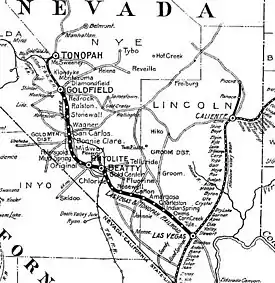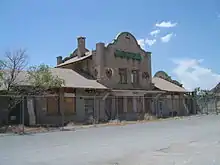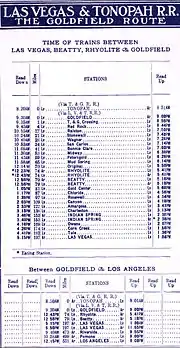Las Vegas and Tonopah Railroad
The Las Vegas and Tonopah Railroad was a 197.9-mile (318.5 km) railroad built by William A. Clark that ran northwest from a connection with the mainline of the San Pedro, Los Angeles and Salt Lake Railroad at Las Vegas, Nevada to the gold mines at Goldfield. The SPLA&SL railroad later became part of the Union Pacific Railroad and serves as their mainline between Los Angeles and Salt Lake City.
 | |
 Map showing the route of the LV&&T. | |
| Overview | |
|---|---|
| Headquarters | Los Angeles, California |
| Reporting mark | LV&T |
| Locale | Las Vegas to Goldfield, Nevada |
| Dates of operation | 1906–1918 |
| Technical | |
| Track gauge | 4 ft 8 1⁄2 in (1,435 mm) standard gauge |
History
In April 1905, Clark made a verbal agreement with Francis Marion Smith that Smith could build a rail line to his borax operations at Lila C connecting with the San Pedro, Los Angeles and Salt Lake Railroad at Las Vegas. After Smith's men had already graded 12 miles (19 km) for tracks, his workers received a no trespassing order that they were not allowed to connect with Clark's rail. Clark had apparently changed his mind, and subsequently, he laid his own rail on the line graded by Smith's men. In response, Smith started his own competing railroad, the Tonopah and Tidewater to the Goldfield boomtowns in direct competition with Clark.[1]

The Las Vegas and Tonopah Railroad was incorporated on September 22, 1905. On March 1, 1906, the track was completed between Las Vegas and Indian Springs. By June 30, 1906, the line was over 50% completed (100 miles or 160 kilometres), reaching Rose's Well. In December 1906 the tracks reached Rhyolite. Finally, in November 1907 the entire 198-mile (319 km) line was in operation between Las Vegas and Goldfield.
The northern end of the line (Beatty - Goldfield) was only in operation from 1908 - 1914. That 80 miles (130 km) of track was removed during World War I. The Las Vegas & Tonopah continued to serve the Bullfrog Mining District at Beatty until 1917/1918. By 1919, the remaining 110 miles (180 km) of track was abandoned and scrapped.
Operations

In 1906 the 118-mile (190 km) trip from Las Vegas to Beatty took 6 hours. Trains operated daily until February 1, 1917, and then became tri-weekly until abandonment.
The LV&T depot at Rhyolite still remains. It was constructed in 1909 at a cost of $130,000.[2]
Locomotives
The railroad primarily used "Ten Wheeler" 4-6-0 and Consolidation (2-8-0) type locomotives, primarily manufactured by Brooks and Baldwin Locomotive Works. The railroad's first four locomotives were purchased in used condition. The railroad would later purchase 12 additional new locomotives. Upon abandonment of the railroad in 1917/1918, these locomotives were sold to the Northwestern Pacific Railroad, the Los Angeles and Salt Lake Railroad and the San Diego and Arizona Railway.
When the LV&T merged with the Bullfrog Goldfield Railroad in 1914, it also acquired its 6 steam locomotives, involving two 0-6-0 switcher locomotives, two 4-6-0 passenger locomotives, and two 2-8-0 freight locomotives.[3]
| Number | Type | Builder | SN | Built | Disposition | Notes |
|---|---|---|---|---|---|---|
| 1 | 4-6-0 | Baldwin Locomotive Works | 11867 | 5/1891 | Sold in 1920 to Outer Harbor Terminal Railway #2 | Purchased from Los Angeles & Salt Lake #50 in 1906. |
| 2 | 4-6-0 | Baldwin Locomotive Works | 12204 | 9/1891 | Sold in 1909 to Nevada Copper Belt #1 | Purchased from Los Angeles & Salt Lake #51 in 1906. |
| 3 | 0-6-0 | Baldwin Locomotive Works | 29712 | 11/1906 | Sold in 1910 to Ludlow & Southern #3 | Purchased from Bullfrog Goldfield #3 in 1907. |
| 4 | 4-6-0 | Baldwin Locomotive Works | 30105 | 2/1907 | Sold in 1918 to Northwestern Pacific #170 | |
| 5 | 4-6-0 | Baldwin Locomotive Works | 30106 | 2/1907 | Sold in 1918 to Northwestern Pacific #171 | |
| 6 | 4-6-0 | Baldwin Locomotive Works | 30107 | 2/1907 | Stored after abandonment , sold in 1931 to Six Companies #7107 | |
| 7 | 4-6-0 | Baldwin Locomotive Works | 31093 | 6/1907 | Sold in 1917 to San Diego & Arizona #24 | |
| 8 | 4-6-0 | Baldwin Locomotive Works | 31094 | 6/1907 | Sold in 1918 to Northwestern Pacific #172 | |
| 9 | 4-6-0 | Baldwin Locomotive Works | 32250 | 11/1907 | Sold in 1917 to San Diego & Arizona #25 | |
| 10 | 4-6-0 | Baldwin Locomotive Works | 32251 | 11/1907 | Sold in 1917 to San Diego & Arizona #26 | |
| 11 | 4-6-0 | Baldwin Locomotive Works | 32260 | 12/1907 | Sold in 1917 to San Diego & Arizona #27 | |
| 12 | 4-6-0 | Alco Schenectady | 44753 | 1907 | Sold in 1918 to Northwestern Pacific #179 | |
| 30 | 2-8-0 | Alco Brooks | 44750 | 1907 | Sold in 1918 to Los Angeles & Salt Lake #3675 | |
| 31 | 2-8-0 | Alco Brooks | 44751 | 1907 | Sold in 1918 to Los Angeles & Salt Lake #3676 | |
| 32 | 2-8-0 | Alco Brooks | 44752 | 1907 | Sold in 1918 to Los Angeles & Salt Lake #3677 |
Preservation
The Los Angeles Live Steamers group owned an old wooden passenger car which they had named "Tonopah" and labeled it as an ex-Las Vegas & Tonopah car. However, it has been confirmed it was actually from the Tonopah & Tidewater Railroad, and never actually worked on the LV&T.
Route
- Las Vegas (MP 0.0)
- Tule
- Corn Creek
- Owens
- Indian Springs (MP 43.0)
- Charleston, possibly named after nearby Mount Charleston, 4th highest peak in Nevada.
- Amargosa (MP 74.0)
- Canon
- Rosewell (Rose's Well) (MP 100.0)
- Chloride
- Beatty MP (118.4)
- Rhyolite (MP 123.4), with spur to Montgomery-Shoshone Mine.
- Original
- Mud Springs
- Midway
- Bonnie Claire
- Wagner
- Stonewall
- Ralston, possibly named after Ralston Valley.
- Red Rock
- Milltown
- Columbia
- Goldfield (MP 196.9)
See also
References
- "The Great Desert Railroad Race" Documentary written and produced by Ted Faye
- "The Las Vegas & Tonopah Railroad Depot". Rhyolite Ghost Town, Nevada. Retrieved 2008-09-17.
- Bullfrog Goldfield Railroad Locomotive Roster
- Myrick, David F. (1962). Railroads of Nevada and Eastern California, Volume One - The Northern Roads. Berkeley, California: Howell-North Books. ISBN 0-87417-193-8.
- Robertson, Donald B. (1986). Encyclopedia of Western Railroad History - The Desert States. Caldwell, ID: The Caxton Printers. ISBN 0-87004-305-6.
- Walker, Mike (1997). Steam Powered Video's Comprehensive Railroad Atlas of North America - California and Nevada - Post Merger Ed. Kent, United Kingdom: Steam Powered Publishing. ISBN 1-874745-08-0.
External links
| Wikimedia Commons has media related to Las Vegas and Tonopah Railroad. |
